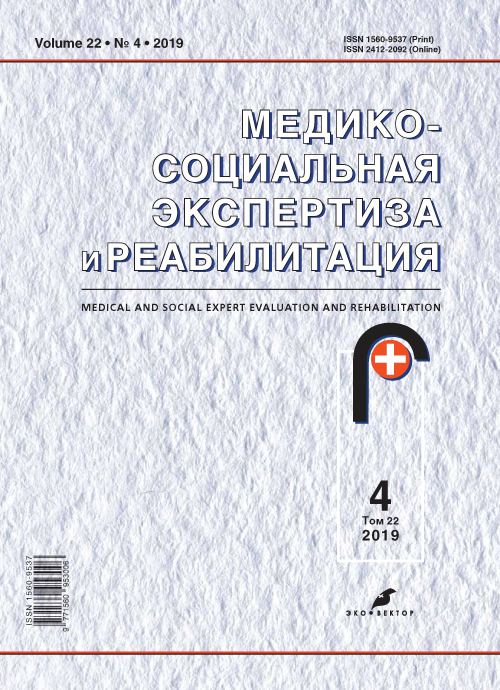Vol 22, No 4 (2019)
- Year: 2019
- Articles: 3
- URL: https://rjmseer.com/1560-9537/issue/view/3001
- DOI: https://doi.org/10.17816/MSER.224
Full Issue
Expertise and rehabilitation
Theoretical foundations for assessing the ability of persons with mental disorders to live independently, including with support
Abstract
For people with disabilities who have limitations that impede normal life activities, including due to disorders of mental functions, technologies of accompanied living are developing. Development of theoretical foundations for an expert assessment of the ability of citizens with physical / mental disorders to live independently to develop a financial and organizational model for providing them with the necessary social support services, as well as medical, educational and other services within the framework of support. Based on the methodology of the general scientific didactic method of cognition, universal scientific methods, methods and principles of rehabilitation and expert diagnostics are used. The indicators of the number of persons in need of accompanied accommodation were obtained as a result of monitoring in 85 constituent entities of the Russian Federation according to a special methodology developed by Federal State Budgetary Institution “Federal Scientific Centre of Rehabilitation of the Disabled n. a. G.A. Albrecht” of the Ministry of Labour and Social Protection of the Russian Federation. The conceptual framework of the ICF was used to develop the conceptual apparatus. The term “living independently” includes measurable criteria for the Activity and Participation Sections, with particular emphasis on the selfcare (d510–599) and domestic life (d610–699) domains. ICF criteria and domains have great internal coherence, mutual correspondence of clinical, clinicalpsychological and medicalsocial aspects of mental health disorders. In the light of the biopsychosocial model of disability, the following factors have been identified that affect the ability of persons with mental disorders to live independently and be able to work: biomedical factors, factors of activity and participation, personal factors. The theoretical foundations for assessing the ability of persons with mental disorders to live independently, including with accompaniment, are based on the principles of humanism, interiorization, normalization of life for those living in inpatient institutions, an integrated approach, maximum objectification, measurability and uniformity. For these purposes, criteria have been developed using the Unified ICF Assessment Scale. The developed criteria for assessing the ability of persons with mental impairments to live independently, including with an accompaniment, will make it possible to solve questions about the form of life and employment of citizens with mental disorders, introduce inpatientreplacing technologies and carry out the downsizing of inpatient institutions.
 6-14
6-14


Evaluation Fund for the working program of the training discipline (module) "Geriatrics": control practical tasks; situational tasks
Abstract
The evaluation funds fund refers to a set of control measuring materials designed to evaluate competencies both at different stages of training (current control) and at the completion of individual stages (intermediate control) and the main educational program (final certification).
At design of estimated means the special place is allocated to identification of the important competences (knowledge, abilities, skills) necessary for the qualified solution of new tasks. As evaluation tools used for this purpose, thematic situational tasks and control tasks have been developed that identify the practical training of the resident.
 15-21
15-21


Forms of control of knowledge, abilities, skills, experience of activity and competences formed as a result of development by interns of the working program of a subject matter (module) "Geriatrics"
Abstract
The monitoring WCF is used for the operational and regular management of training activities (including independent) of the student. The monitoring WCF provides an assessment of the progress in the development of sections and topics of the training discipline (module). In the conditions of the point rating control system, the results of the current assessment are used as an indicator of the current rating of the student.
 22-50
22-50












